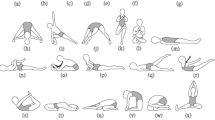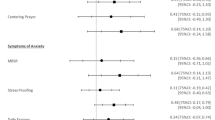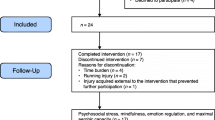Abstract
This study involved a complete component analysis of Stress Inoculation Training (SIT) for the reduction of cold pressor pain. SIT consists of an Education, Skills Acquisition, and Application phase. Each of these three phases alone, all possible pairs of phases, the complete protocol, and a pseudotreatment control were presented to groups of university women. While the complete protocol increased pain tolerance relative to the control protocol, not all of the phases of SIT were found to be important to the package. Only the Skills Acquisition phase played an important role in the SIT package. That is, when the Skills Acquisition phase was dropped from the package, the efficacy of SIT was significantly lower. While the Education phases increased pain tolerance when presented alone, it did not appear to add to the efficacy of the total package. The Application phase was ineffective for increasing tolerance by itself and did not add to the efficacy of SIT. Further data suggested that the effects of the Skills Acquisition phase might be mediated by increased use of relaxation and/or by a decrease in catastrophizing. Self-instructions were not readily employed and may not be important in increasing tolerance in the analogue context. These findings question the multidimensional training approach to SIT for analogue pain, as well as the focus on the role of self-instructions within the SIT package.
Similar content being viewed by others
References
Bandura, A. (1977). Self-efficacy: toward a unifying theory of behavioral change.Psychological Review, 84 191–215.
Beers, T., & Karoly, P. (1979). Cognitive strategies, expectancy, and coping style in the control of pain.Journal of Consulting and Clinical Psychology, 47 179–180.
Chaves, J., & Barber, T. (1974). Cognitive strategies, experimenter modeling and expectation in the attenuation of pain.Journal of Abnormal Psychology, 83 356–363.
Girodo, M., & Wood, D. (1979). Talking yourself out of pain: The importance of believing that you can.Cognitive Therapy and Research, 3 23–33.
Hackett, G., & Horan, J. (1980). Stress inoculation for pain: What's really going on?Journal of Counseling Psychology, 27 107–116.
Hackett, G., Horan, J., Buchanan, C., & Zumoff, P. (1979). Improving exposure component and generalization potential of stress inoculation for pain.Perceptual and Motor Skills, 48 1132–1134.
Horan, J., Hackett, G., Buchanan, C., Stone, C., & Demchik-Stone, D. (1977). Coping with pain: A component analysis of stress inoculation.Cognitive Therapy and Research, 1 211–221.
Hussian, R., & Lawrence, P. (1973). The reduction of test, state, and trait anxiety by testspecific and generalized stress inoculation training.Cognitive Therapy and Research, 2 25–37.
Jaremko, M. (1979). A component analysis of stress inoculation: Review and prospectus.Cognitive Therapy and Research, 3 35–48.
Jaremko, M., Hadfield, R., & Walker, W. (1980). Contribution of an education phase to stress inoculation of speech anxiety.Perceptual and Motor Skills, 50 495–501.
Klepac, R., Hauge, G., Dowling, J., & McDonald, M. (1981). Direct and generalized effects of three components of stress inoculation for incresed pain tolerance.Behavior therapy, 12 417,424.
Meichenbaum, D. (1977).Cognitive-behavior modification: An integrative approach. New York: Plenum Press.
Meichenbaum, D., & Cameron, R. (1972).Stress inoculation: A skills training approach to anxiety management. Unpublished manuscript, University of Waterloo.
Melzack, R. (1973).The puzzle of pain. Harmondsworth, England: Penguin.
Rybstein-Blinchik, E. (1978, November).The effects of different cognitive strategies on chronic pain experience. Paper presented at the annual convention of the Association for the Advancement of Behavior Therapy, Chicago.
Scott, D., & Barber, T. (1977). Cognitive control of pain: Effects of multiple cognitive strategies.Psychological Record, 2 373–383.
Siegel, L., & Peterson, L., (1980). Stress reduction in young dental patients through coping skills and sensory information.Journal of Consulting and Clinical Psychology, 48 785–787.
Stone, C., Demchik-Stone, D., & Horan, J. (1977). Coping with pain: a component analysis of Lamaze and cognitive-behavioral procedures.Journal of Psychosomatic Research, 21 451–456.
Turk, D. (1978). Cognitive-behavioral techniques in the management of pain. In J. Foreyt & D. Rathjen (Eds.),Cognitive behavior therapy: Research and applications. New York: Plenum Press.
Winer, B. (1971).Statistical principles in experimental design. New York: McGraw-Hill.
Worthington, E. (1978). The effects of imagery content, choice of imagery, and self-verbalization on the self-control of pain.Cognitive Therapy and Research, 2 225–239.
Worthington, E., & Shumate, M. (1981). Imagery and verbal counseling methods in stress inoculation training for pain control.Journal of Counseling Psychology, 28 1–6.
Author information
Authors and Affiliations
Additional information
This research was conducted while the author was being funded by a studentship from the Medical Research Council, Ottawa, Canada. I would like to thank Dr. Brad Bucher and Janice Howes for their editorial assistance on earlier drafts of this paper. I also acknowledge the assistance of Dr. B. Jessup.
Rights and permissions
About this article
Cite this article
Vallis, T.M. A complete component analysis of Stress Inoculation for pain tolerance. Cogn Ther Res 8, 313–329 (1984). https://doi.org/10.1007/BF01173001
Issue Date:
DOI: https://doi.org/10.1007/BF01173001




